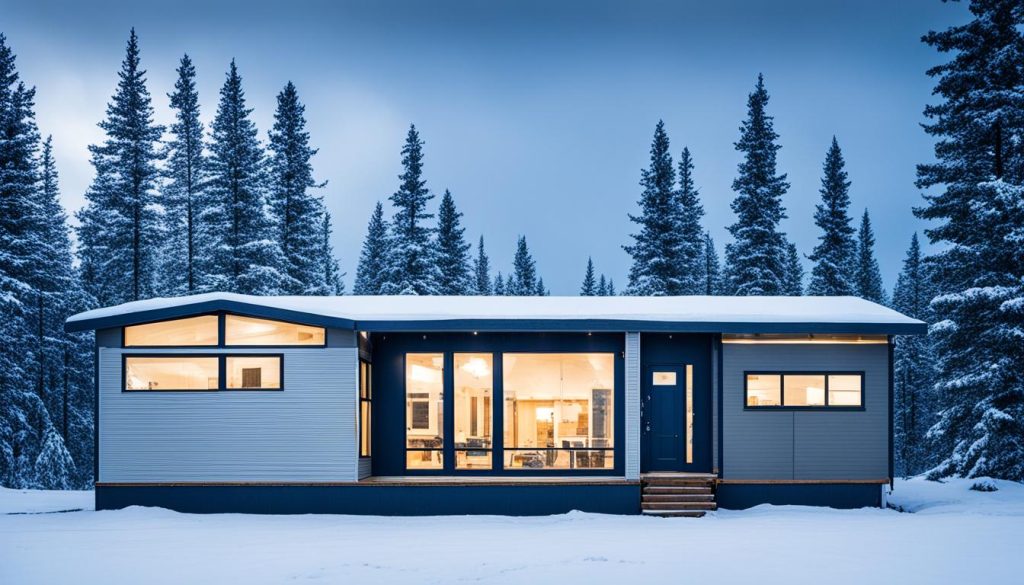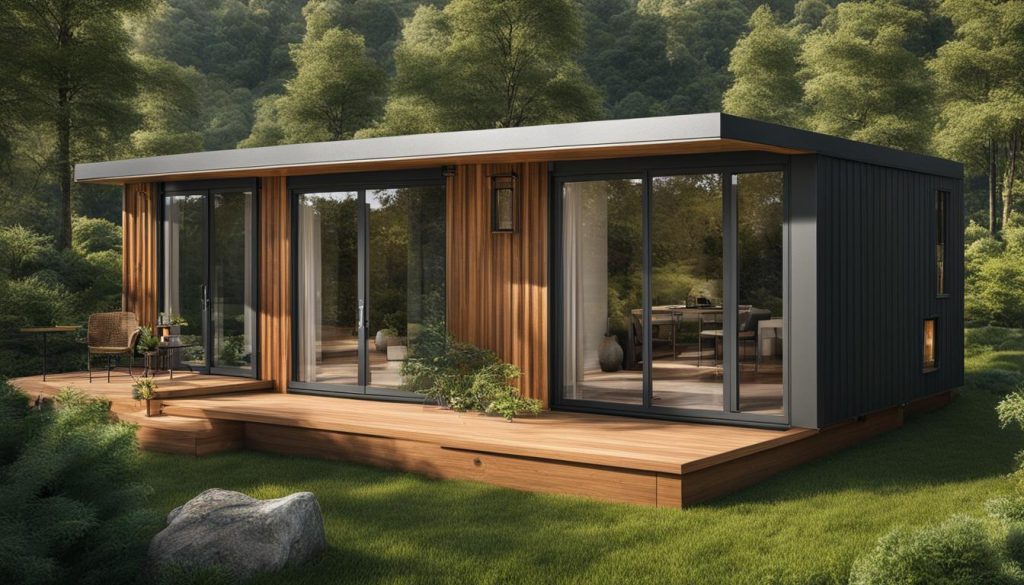Did you know that modular homes can last just as long as traditional site-built homes, and sometimes even longer? It’s a fascinating fact that sheds light on the durability and longevity of these innovative housing options. When considering how long modular homes last, various factors come into play, including the quality of materials, construction techniques, and environmental conditions.
Modular homes are constructed in a factory setting with strict quality control measures in place. This ensures that the materials used are carefully selected and inspected before being used in construction. In fact, modular homes may even be constructed with higher-quality materials to withstand the stresses of transportation and installation.
Once the modules are delivered to the building site, they are assembled on a foundation that is designed to last as long as a traditional foundation, which is often 50 to 100 years or more. Regular maintenance is key to keeping a modular home in good condition, but they generally require less maintenance compared to traditional site-built homes.
Environmental factors, such as saltwater, humidity, and extreme weather, can impact the lifespan of a modular home. However, by choosing the right materials and construction techniques, modular homes can be built to withstand these factors and last just as long as traditional homes.
Key Takeaways:
- Modular homes can last as long as traditional site-built homes, if not longer.
- Quality materials and construction techniques contribute to the longevity of modular homes.
- Regular maintenance is essential for keeping a modular home in good condition.
- Environmental factors can affect the lifespan of modular homes, but proper construction can mitigate these effects.
- Modular homes offer a durable and long-lasting housing option for homeowners.
Factors Affecting the Lifespan of Modular Homes
When considering the lifespan of a modular home, several factors come into play. The quality of the materials used in construction is a significant determinant. Modular homes built with high-quality materials, such as a steel frame structure, can last around 83 years, while those constructed with a laminated timber frame have an average lifespan of about 65 years.
Build quality is another crucial factor. Construction errors and mistakes can lead to structural failures and damage, ultimately decreasing the lifespan of a modular home. It is essential to choose a reputable builder with expertise in modular home construction to ensure proper assembly and construction.
The ability of a modular home to withstand various environmental elements such as the sun, humidity, rain, and snow can significantly impact its longevity. Different geographic locations with varying weather conditions may result in different lifespans for modular homes. For example, a modular home in a coastal area with high saltwater exposure may require specific materials and construction techniques to combat corrosion and withstand the elements.
Understanding these factors is crucial when considering the lifespan of a modular home. By selecting high-quality materials, ensuring proper construction, and accounting for environmental conditions, homeowners can maximize the longevity of their modular homes.
Factors Affecting Modular Home Lifespan:
| Factor | Lifespan Impact |
|---|---|
| Quality of Materials | Durable materials extend lifespan |
| Build Quality | Proper construction essential for longevity |
| Environmental Elements | Impact of sun, humidity, rain, and snow |
| Geographic Location | Varying weather conditions affect lifespan |
Durability and Maintenance of Modular Homes
Modular homes are built to last, offering the same level of durability as traditional homes. With rigorous quality control measures and construction in a controlled environment, modular homes are designed to withstand the test of time.
Regular maintenance is crucial to ensure the longevity of a modular home. By promptly addressing repairs or replacements for components such as the roof, siding, plumbing, HVAC, and mechanical systems, homeowners can prevent issues from escalating and compromising the structural integrity of the home.
Cleaning the modular home regularly is also essential for maintenance. This helps prevent pest infestations that can cause damage, especially for modular homes with wooden structures. Additionally, keeping moisture at bay both inside and outside the home is crucial to avoid water damage and structural deterioration.
Proper care and maintenance will not only extend the lifespan of a modular home but also contribute to its continued beauty and functionality for years to come.

Maintenance Checklist for Modular Homes
| Component | Maintenance Tasks |
|---|---|
| Roof | Regular inspections, cleaning of debris, repair of damaged shingles |
| Siding | Cleaning, repainting or resealing as needed |
| Plumbing | Check for leaks, maintain proper drainage, winterize as necessary |
| HVAC | Change filters regularly, schedule professional inspections and maintenance |
| Mechanical Systems | Regular service and maintenance according to manufacturer’s recommendations |
Advantages of Modular Homes for Longevity
Modular homes offer several advantages that contribute to their longevity and durability. These advantages make them an attractive option for homeowners who are looking for a long-lasting and reliable housing solution.
One of the key advantages of modular homes is the protection of construction materials during the manufacturing process. Modular homes are built in a sheltered environment, which helps preserve the quality of the materials used. This protection ensures that the materials stay in optimal condition, resulting in a longer lifespan for the home.
The factory-like setting where modular homes are constructed provides ideal working conditions for builders. This controlled environment allows for precise construction techniques and meticulous attention to detail. As a result, modular homes are often better-built and more durable than traditional site-built homes.
Furthermore, extensive quality controls are implemented at every stage of the construction process for modular homes. These quality controls help to minimize the likelihood of delivering a home with construction mistakes or defects. The rigorous inspection and testing procedures ensure that modular homes meet high-quality standards, enhancing their longevity and reliability.
By choosing a modular home, homeowners can benefit from these advantages and enjoy a well-built, durable, and long-lasting living space.
Take a look at the comparison table below to see how some of the advantages of modular homes contribute to their longevity:
| Advantages | How They Contribute to Longevity |
|---|---|
| Protected Construction Materials | Preserves initial quality and ensures longer lifespan |
| Ideal Working Conditions | Promotes better-built and more durable houses |
| Extensive Quality Controls | Reduces likelihood of construction mistakes or defects |
Overall, modular homes provide homeowners with the advantage of longevity and durability. Through the protection of construction materials, ideal working conditions, and extensive quality controls, modular homes offer a reliable and long-lasting housing option for those seeking a solid investment.

Conclusion: Longevity and Investment Value of Modular Homes
When it comes to longevity, modular homes are a reliable choice that can stand the test of time. Built with high-quality materials and constructed with efficiency in mind, modular homes can last just as long as traditional site-built homes, and sometimes even longer. With the added benefit of strict quality control measures in the factory setting, modular homes are designed to withstand the stresses of transportation and installation.
Choosing a reputable modular home builder is key to ensuring the longevity of your investment. By working with experienced professionals who understand the importance of quality craftsmanship, you can have peace of mind knowing that your home will be built to last. Additionally, performing regular maintenance, like addressing repairs promptly and keeping the home clean, can further extend its lifespan.
Investing in a modular home not only offers durability and longevity but also provides great value for homeowners. Modular homes are a smart long-term investment that offers a comfortable and durable living space. With an array of customization options available, you can create a home that suits your needs and preferences perfectly. Whether you’re looking for a starter home or a forever home, modular homes offer a reliable and cost-effective choice.

Leave a Reply
You must be logged in to post a comment.